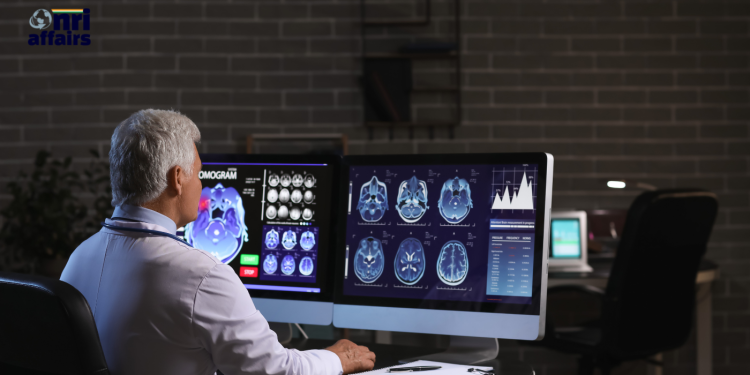In the pursuit of unraveling the mysteries of dementia and revolutionizing its diagnosis, a groundbreaking study led by a world-class research team in the UK has recently garnered significant attention. Spearheaded by Dr. Ashvini Keshavan, a distinguished Indian-origin neurologist and Senior Clinical Research Fellow at University College London (UCL), this research initiative aims to build upon recent breakthroughs in potential dementia diagnosis blood tests. The study, named ADAPT, along with another parallel endeavor called READ-OUT, holds the promise of transforming the landscape of dementia diagnosis in the coming years.
The Promise of Biomarkers
Central to this pioneering research is the exploration of biomarkers, particularly focusing on plasma p-tau217, recognized as a promising blood marker for Alzheimer’s disease. The ADAPT study revolves around elucidating whether knowledge of this specific biomarker can enhance the accuracy of Alzheimer’s diagnosis when integrated with standard memory clinic assessments. Simultaneously, the READ-OUT study, led by researchers from the Universities of Oxford and Cambridge, aims to evaluate various proteins, including novel or less established ones, for their efficacy in detecting a spectrum of dementia-causing diseases.
Bridging Research with Real-World Application
One of the distinguishing features of this study is its emphasis on translating research findings into real-world applications. By recruiting participants from diverse demographic backgrounds across the UK, the research team endeavors to ensure the inclusivity and applicability of their findings. Dr. Keshavan underscores the importance of reflecting the UK’s ethnic and socioeconomic diversity to broaden access to these tests, thereby addressing the current limitations posed by the cost and invasiveness of existing diagnostic methods.
Catalyzing Change through Collaborative Funding
The magnitude of this research endeavor is underscored by the substantial funding it has received through initiatives like the Blood Biomarker Challenge grant. Supported by organizations such as Alzheimer’s Society, Alzheimer’s Research UK, the UK’s National Institute for Health and Research, and Gates Ventures, alongside contributions from players of People’s Postcode Lottery, this multi-million-pound grant signifies a concerted effort to catalyze advancements in dementia diagnosis and care.
Pioneering Potential Impact
The potential impact of this research extends far beyond the realms of academia and into the lives of individuals affected by dementia. Dr. Keshavan envisions a future where these blood tests could become an integral part of standard care in the UK, facilitating earlier and more accurate diagnoses of specific dementia-causing diseases. Such breakthroughs not only enable timely interventions but also pave the way for equitable access to emerging treatments, thus offering hope to millions worldwide.
Empowering Patients through Knowledge
At the heart of this endeavor lies a commitment to empowering patients and their families through timely and accurate diagnoses. Dr. Vanessa Raymont, Associate Director of Dementias Platform UK, underscores the transformative potential of a diagnosis, citing personal experiences with familial dementia. By demystifying dementia and providing actionable insights, these blood tests herald a new era of proactive healthcare, wherein individuals can access the support and resources they need to navigate the complexities of this condition.
Embracing the Future of Diagnosis
As the global healthcare landscape continues to evolve, the advent of blood tests for dementia diagnosis represents a significant step towards democratizing healthcare access. Quick, non-invasive, and cost-effective, these tests hold the promise of revolutionizing diagnostic practices, ensuring that individuals receive the care and support they deserve. With dedicated research endeavors like ADAPT and READ-OUT leading the charge, the future of dementia diagnosis appears increasingly promising, offering renewed hope to millions around the world.
The strides made by Dr. Ashvini Keshavan and her esteemed colleagues in advancing dementia diagnosis represent a beacon of hope in the fight against this debilitating condition. Through relentless research, collaborative funding efforts, and a commitment to inclusivity, their work embodies the transformative potential of scientific inquiry. As we stand on the cusp of a new era in healthcare, characterized by accessibility, empowerment, and innovation, these endeavors serve as a testament to the indomitable spirit of human ingenuity in the face of adversity.











